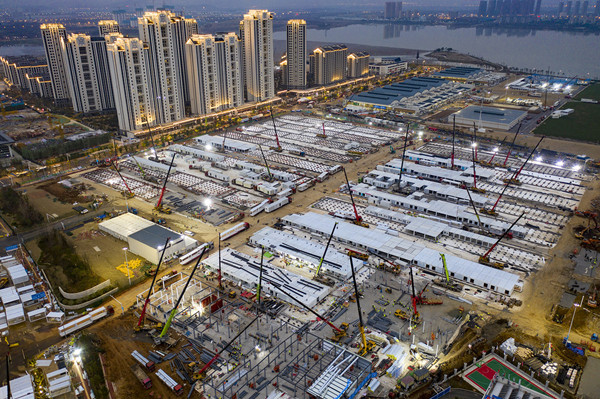CNBM Boosts Central SOEs' Epidemic Fight

A file photo of the construction work being undertaken for the Leishenshan Hospital in Wuhan, on Feb 4. The hospital was finished on Feb 8, 14 days after the project was conceived. [Photo/Chutian Metropolis Daily]
Conglomerate steps up manufacturing activities across various units in China
Central State-owned China National Building Material Group Co Ltd has taken steps to resume operation in various sectors, giving priority to those which are related to epidemic control in the middle of joint efforts from State-owned enterprises to battle the novel coronavirus and support the economy.
The company's move is aligned with the call from State-owned Assets Supervision and Administration Commission of the State Council to ensure stable production and operations to back the country's economic development while preventing the virus from spreading further.
Zhou Yuxian, chairman of the CNBM, said the company is aiming at grasping "the first market share "after the epidemic.
Zhou said the company will pay close attention to changing demand from the market and the reactions of companies from the upstream and downstream supply chain, all the while operating under the premise that the staff's safety and health will be well protected.
CNBM also released guidelines of resuming work and epidemic prevention for different sectors earlier this month.
For the cement business, CNBM urged the resumption of the full production for subsidiaries related to life and medical waste handling under the guidelines of local governments. CNBM asked other company subsidiaries to restart work gradually in different batches based on market demand.
Beixin Resilient Flooring Co Ltd, a Changzhou, Jiangsu province-based flooring manufacturer under CNBM, applied to a local government for resumption of work on Feb 8, which was earlier than the local government's regulated timeline to restart work, to support the building of new hospitals in epidemic stricken areas.
The company said nearly 60,000 square meters of the ground work at Leishenshan Hospital, a makeshift hospital in Wuhan, was built with their products. The company also contributed to the construction of nearly 18,000 square meters of hospital ground work in other cities.
For the new material sector, CNBM urged subsidiaries that produce medical equipment to resume production during the Spring Festival to battle the epidemic, while taking measures to prevent workplace infection.
CNBM (Chengdu) Optoelectronic Materials Co Ltd, a subsidiary specializing in the production of core materials of infrared thermometer lenses, restarted work earlier than most of the companies based in Sichuan province as it faced a growing need of screening inspection equipment used to battle the disease.
Another subsidiary, the China Building Materials Academy Glass Science Institute, also resumed production earlier than other firms in Beijing. To date, the subsidiary has deployed 800 sets of high-resolution infrared lenses for screening inspection to cities such as Wuhan, Chengdu, and Guangzhou.
CNBM also released guidelines to restart work in its engineering technology and service sector while taking measures to prevent the spread of the virus.
As of Feb 19, more than 80 percent of over 20,000 manufacturing subsidiaries under the 96 central SOEs have resumed production, SASAC said.
Xia Qingfeng, director of the Bureau of Publicity of SASAC, said at a news conference that it is of vital importance to fight the outbreak and maintain economic development.
Xia said central SOEs should be the pillar of economic development during the epidemic. He noted it is necessary for SOEs to resume production in different batches, with reference to regions in which they are located, whether the industries are urgently needed, and consideration for the projects they are working on.
Xia encouraged central SOEs in areas that are less influenced by the epidemic to resume full production.
Central SOEs in areas that are severely influenced by the epidemic like Hubei province should only resume work after the virus is effectively controlled. The exception would be for those enterprises closely linked to producing necessary supplies, Xia said.
Xia also said central SOEs in industries related to epidemic control, energy, and life necessities should step up efforts to resume full production. The central SOEs should formulate a thorough plan to resume work and a mechanism against the spread of infection in the workplace.
To date, central SOEs are resuming work in batches in an orderly manner while preventing the disease from contaminating the workplace, which is important to both economic development and epidemic control, according to SASAC.



